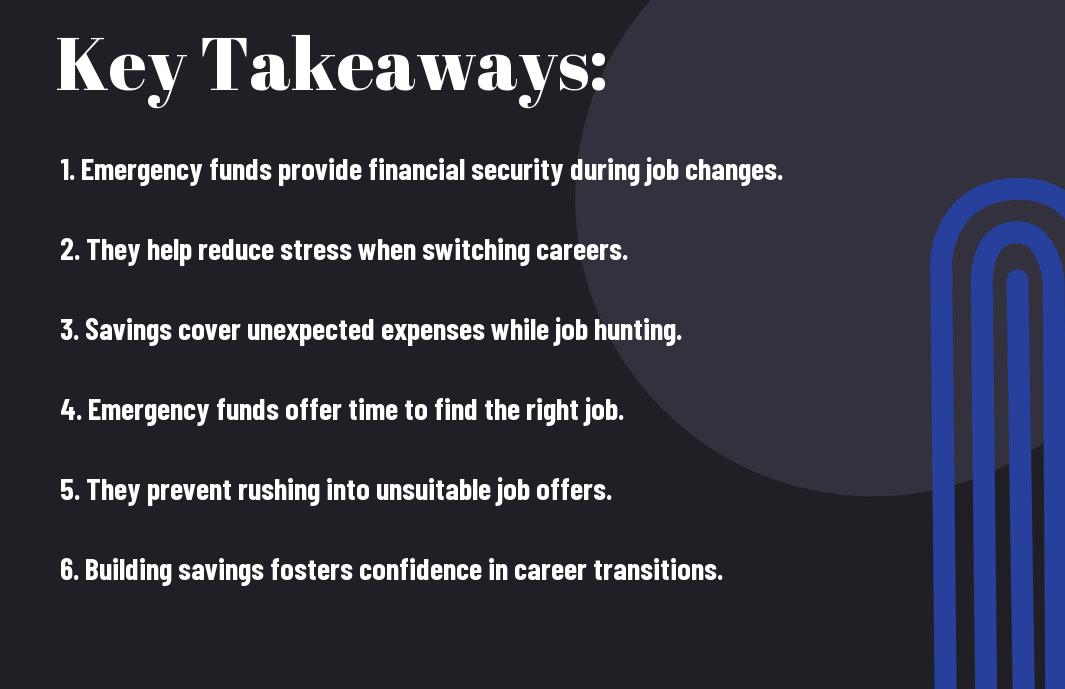Just like planning for a big trip, switching careers requires careful financial planning. Having an emergency fund is necessary for you as you make this significant change. It acts as a safety net, giving you peace of mind when transitioning to a new job. If you’re unsure where to begin, check out this resource on Finances During Job Transition. Building an emergency fund can help you navigate unexpected expenses and stabilize your financial health during this period of change.
Key Takeaways:
- An emergency fund provides financial security during job transitions, reducing stress and allowing for better decision-making.
- Having three to six months’ worth of living expenses saved can help you explore new career opportunities without the fear of running out of money.
- Building an emergency fund is a smart step for anyone considering a career change, as it offers peace of mind and flexibility to pursue your passions.

Understanding Emergency Funds
For anyone considering a career switch, understanding emergency funds is important. An emergency fund acts as a financial safety net that can protect you while navigating new job opportunities. It serves as your fallback in case of unexpected expenses or income loss during this transitional period. Having this fund allows you to make decisions without the stress of financial instability influencing your choices.
What is an Emergency Fund?
Behind every secure financial plan lies an emergency fund. This fund is a dedicated amount of money set aside to cover unplanned expenses such as medical bills, car repairs, or job loss. In essence, it offers you peace of mind, enabling you to focus on your career switch without the fear of sudden financial challenges disrupting your path.
How Much Should You Save?
By determining how much to save for your emergency fund, you can build a solid financial foundation. A common guideline is to aim for three to six months’ worth of living expenses. This amount can help you stay afloat during periods of uncertainty while you explore new opportunities and improve your skills.
But assessing your personal situation can help you refine this target. Consider your monthly expenses, including rent, groceries, and insurance. If you have dependents or significant financial obligations, you might want to save more. Additionally, if you are transitioning into a field with uncertain job prospects, it’s wise to err on the side of caution and save even more to safeguard your financial stability during your career change.

The Importance of Emergency Funds for Career Switchers
The shift to a new career can be exciting, but it also brings financial challenges. Having an emergency fund helps you manage these obstacles effectively. Why You Need An Emergency Fund highlights how these savings provide a safety net, allowing you to focus on your career change without overwhelming financial stress.
Financial Security During Transition
Behind every successful career switch is a strong financial base. An emergency fund gives you the freedom to pursue new opportunities without worrying too much about day-to-day expenses. With around three to six months’ worth of living costs saved, you can navigate this change smoothly and with confidence.
Managing Uncertainty in New Opportunities
With every career transition comes uncertainty. You may face unexpected challenges like job searches or delays in starting your new role. Having an emergency fund allows you to take calculated risks and explore new opportunities while feeling financially secure.
Emergency funds can ease the fear of the unknown. They ensure that you can cover necessary expenses even during uncertain times. This financial cushion allows you to focus on learning new skills and networking, ultimately helping you to thrive in your new role. By setting aside funds beforehand, you position yourself for a successful transition to your dream career.
How to Build Your Emergency Fund
Keep in mind that building your emergency fund is a step-by-step process. Start by determining how much you need to save. A good goal is to have at least three to six months’ worth of living expenses set aside. You can learn more about the specifics in The Importance of Building an Emergency Savings Fund. It’s all about taking small, consistent actions over time.
Setting Savings Goals
Above all, setting specific savings goals can keep you motivated. Decide on a target amount and set a timeline. For instance, if you want to save $3,000 in one year, plan to save $250 every month. Make your goals SMART—Specific, Measurable, Achievable, Relevant, and Time-bound—to track your progress easily.
Smart Ways to Save Money
Across your daily life, there are many smart ways to save money without changing too much. Review your subscriptions and cut any that you no longer use. You can also cook at home more often instead of dining out. Try using shopping lists and sticking to them to avoid impulse buys. Every dollar you save brings you closer to your fund!
Understanding your spending habits is vital to saving effectively. Analyze where your money goes each month. Using budgeting apps can help you track spending and identify areas to cut back. Consider setting up automatic transfers to your savings account when you receive your paycheck. This way, you save money before you even have a chance to spend it. Each small effort adds up over time and boosts your emergency fund.
When to Use Your Emergency Fund
Once again, using your emergency fund wisely is vital, especially when you’re switching careers. This fund is there to support you during unexpected situations. Think of it as a safety net. You might dip into it for unexpected medical bills, sudden job loss, or urgent home repairs. These circumstances can impact your financial stability. Always assess whether the situation is an emergency before reaching for your savings.
Knowing When It’s Necessary
Beside knowing what qualifies as an emergency, it’s important to act quickly without panicking. Emergencies require immediate attention. Ask yourself if the expense is unavoidable. If you can wait or find another solution, it may be worth holding off. Keep your emergency fund intact for genuine surprises that interrupt your financial plan.
Avoiding Common Misuses
Before using your emergency fund, be mindful of common misuses. Many people mistakenly tap into their savings for planned expenses, like vacations or new electronics. Instead, these should come from your regular budget. Using your fund for non-emergencies can leave you vulnerable when real crises hit.
Common misuses of an emergency fund can really hurt your financial health. For example, using this money to cover everyday expenses might feel easy, but it defeats its purpose. If you don’t reserve these funds for true emergencies, you might find yourself unprepared for genuine financial challenges. Keep your emergency fund dedicated to unexpected needs. This habit will ensure that you have funds available when they matter most.

Tips for Successful Career Switching
Not every career change is easy, but with the right approach, you can make it smoother. Here are some tips to help you navigate your switch:
- Specify your goals for your new career.
- Build an emergency fund to ease financial stress.
- Update your resume to reflect new skills.
- Consider taking online courses for necessary skills.
- Stay positive and persistent during the transition.
Any change can bring challenges, so be prepared and stay focused on your goals.
Researching Your New Field
Across many industries, knowing specific job requirements is important when switching careers. Begin by exploring job descriptions within your chosen field. Look for the necessary skills, qualifications, and common expectations. Use online resources such as LinkedIn, Indeed, or Glassdoor to find valuable information about potential companies and roles.
Networking and Finding Opportunities
By connecting with others in your desired field, you open doors to new opportunities. Reach out to industry professionals on social media platforms. Join local groups or attend relevant events to meet like-minded individuals. These connections can lead to job openings and invaluable advice from those already established in the industry.
Another effective way to expand your network is by leveraging informational interviews. Request time to chat with someone who works in your target field, and ask them about their experiences. This not only helps you learn but also builds relationships that may benefit you later. Attend workshops and webinars related to your new career to showcase your eagerness to learn and meet people who may offer job leads.

Frequently Asked Questions
Many people have questions about emergency funds and their importance, especially when making a career switch. An emergency fund can provide financial security during transitions and help keep you stress-free. This section addresses common concerns, misconceptions, and gives you the information you need to make informed decisions about your financial safety net.
Common Concerns about Emergency Funds
For many, the idea of building an emergency fund can feel overwhelming. You might wonder how much you should save or where to start. Generally, financial experts suggest saving three to six months’ worth of living expenses. This goal can seem daunting, but starting small and setting regular savings targets can help you build your fund over time.
Addressing Myths and Misconceptions
On the topic of emergency funds, several myths can create confusion. Some people believe that only those with high incomes should save. In reality, anyone, regardless of income level, can benefit from having an emergency fund. Saving even a small amount regularly can provide you with peace of mind when facing unexpected expenses.
About the misconceptions surrounding emergency funds, you may also hear that they are only for job loss situations. While job loss is certainly one reason to have an emergency fund, other emergencies—like medical expenses or urgent home repairs—can arise at any time. Building this fund allows you to handle various unexpected financial challenges, providing a safety net that supports your overall stability during a career change.
To wrap up
Ultimately, having an emergency fund is imperative for anyone considering a career switch. It provides you with a financial safety net during a transition, allowing you to explore new opportunities without added stress. By building this fund, you empower yourself to make thoughtful decisions about your career path. Prioritizing your savings can enhance your confidence and readiness to embrace change. Take the first step today by setting aside a portion of your income for this important resource.
Emergency Funds for Career Switchers – FAQ
Q: What is an emergency fund?
A: An emergency fund is a savings account that is set aside for unexpected expenses. These can include job loss, medical bills, or urgent home repairs. Having this fund helps you manage financial stress during difficult times.
Q: Why do career switchers need an emergency fund?
A: When you change careers, there may be a time when you’re not earning a salary right away. An emergency fund provides a financial safety net. It allows you to focus on your new career without worrying about paying bills immediately.
Q: How much should I save for my emergency fund?
A: A good rule of thumb is to save three to six months’ worth of living expenses. This amount will help you cover rent, groceries, and other necessary costs while you adjust to your new job or career path.
Q: How do I start building my emergency fund?
A: Begin by setting a savings goal. Look at your monthly expenses to determine how much you’ll need. Then, set aside a specific amount each month into a separate savings account. Treat it like a bill you’re paying, and over time, you’ll reach your goal.
Q: Can I use my emergency fund for anything other than emergencies?
A: While it’s tempting, it’s best to use your emergency fund only for true emergencies. These funds should be reserved for urgent situations, like unexpected job loss or medical emergencies. This way, your savings stay intact when you really need them.
Key Takeaways
- An emergency fund is important for financial security, especially during a career change.
- Saving three to six months’ worth of expenses is a smart goal.
- Start by setting a monthly savings plan and stick to it.
- Use the fund only for emergencies to ensure you’re prepared for unexpected events.
By understanding the importance of an emergency fund, career switchers can navigate their transitions more smoothly, providing peace of mind as they launch on new professional journeys.




